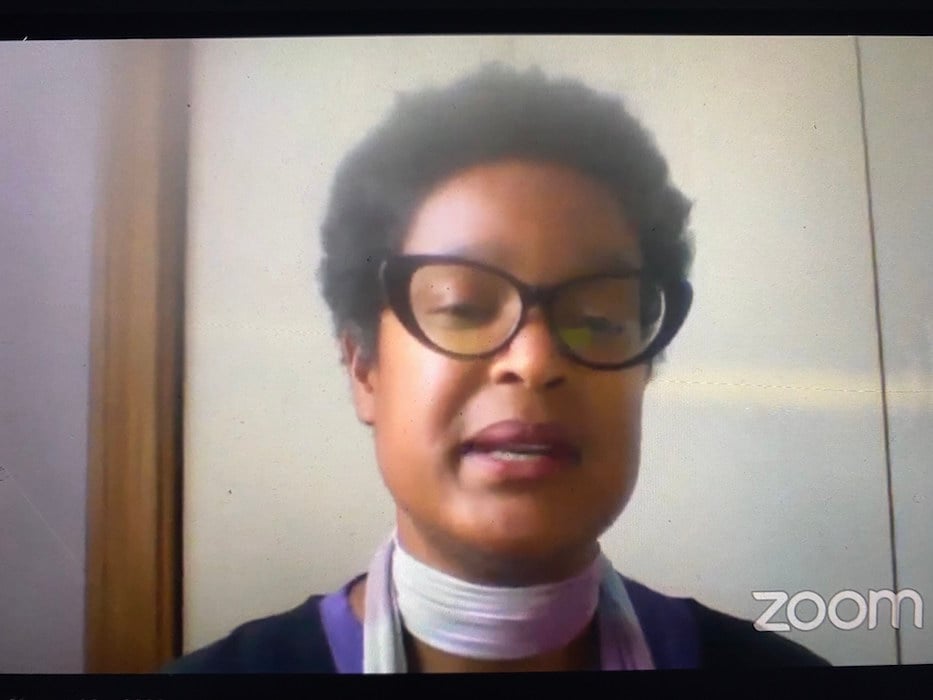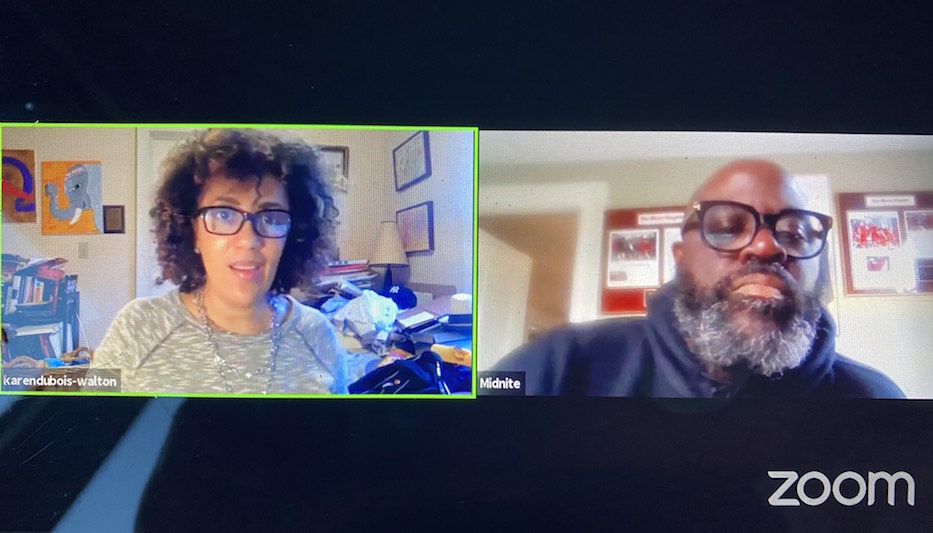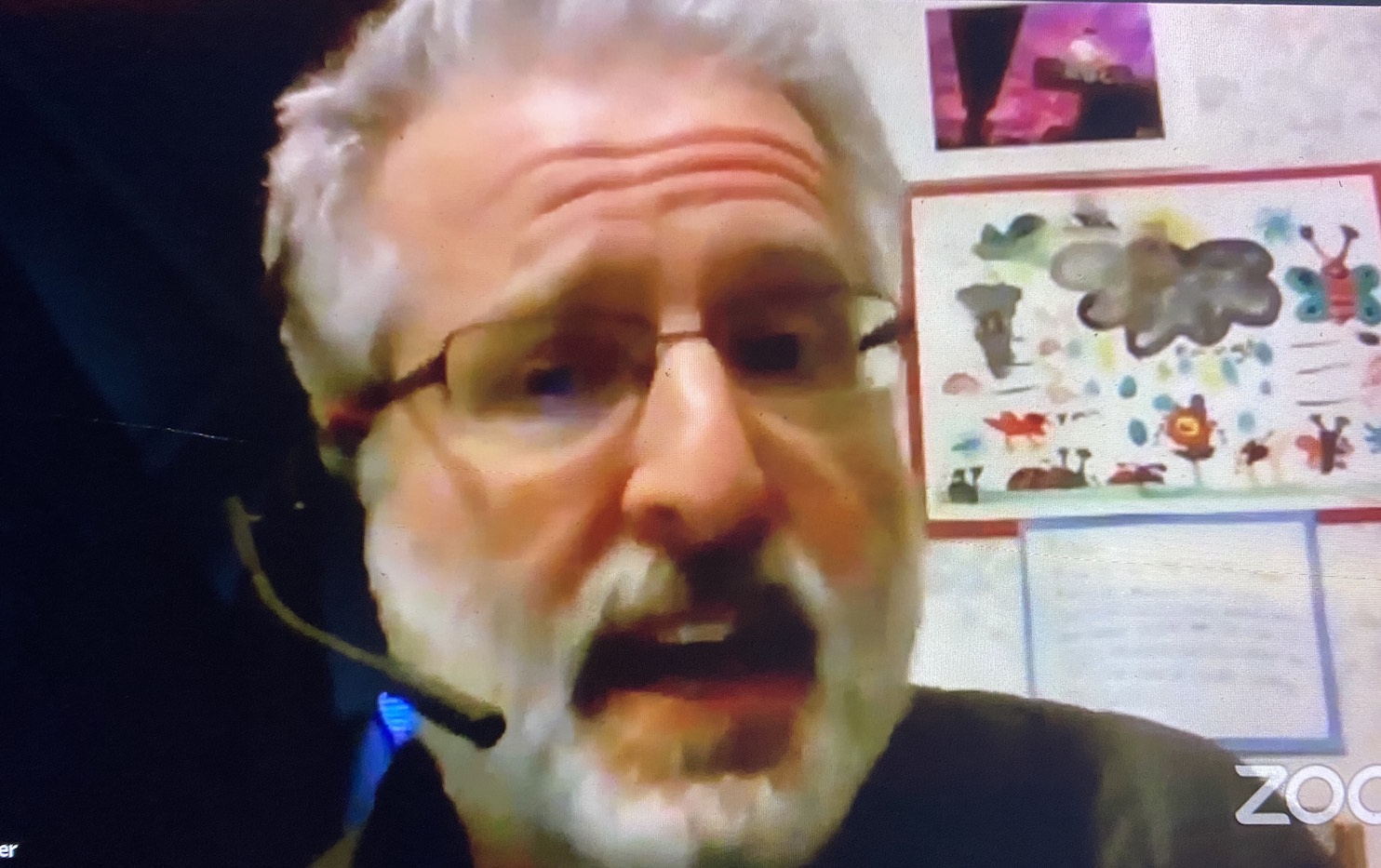
Baobab Tree Studios | ConnCAT | Storytellers New Haven | Storytelling | Arts & Culture | COVID-19

| Amy Jo Myers, who is now an assistant clinical professor of social work and family-based recovery substance use consultant at the Yale School of Medicine. Rachel Ababio screenshot from Zoom. |
Amy Jo Myers didn’t always accept her father. Saul Fussiner didn’t fully know the secrets that died with his. Monday, they came together to tell those stories for New Haven—not in physical space, but to a Zoom room with open ears waiting on the other end.
Myers is an assistant professor social work and family-based recovery substance use consultant at Yale. Fussiner is a longtime storyteller who chairs the creative writing program at the Educational Center for the Arts. This week, they brought their stories at the latest edition of Storytellers New Haven, a monthly storytelling series that has gone fully digital in the wake of COVID-19.
Now almost three years old, the group is usually held at the Connecticut Center for Arts & Technology (ConnCAT) in Science Park. Since the pandemic forced a wave of closures in March, it has taken place via Zoom, which is pushed to YouTube to make it more accessible. Founders Karen DuBois-Walton and Kevin Walton, Jr. have continued to work with Baobab Tree Studios to stream the series.
“This is part of the new world we’re living in as we’re all relating virtually and having to connect,” said DuBois-Walton, who co-founded the series in October 2017, as she troubleshot technical glitches at the beginning of the session. “Hang in there, because you are in for a treat this evening.”
Those words echoed through the internet from the moment Meyers began. Myers grew up in Brooklyn but has lived in New Haven for the past 25 years; she is now an assistant clinical professor of social work at the Yale School of Medicine. As she spoke, she took listeners back to an afternoon in February. She was running errands while listening to This American Life on her car’s radio.
A man told listeners about attending the funeral of a fellow "frog man," or marine, on a friend's behalf. During the funeral, he watched the man’s 10-year-old daughter run out of the service sobbing uncontrollably. He had initially thought she was crying because she missed her dad. Then he found out that she was crying because her father had committed suicide.
She was ashamed that her father hadn’t died “an honorable marine death.” She was certain others would hate her for his actions.
In that moment, “the intensity of her shame was more powerful than her grief and loss,” Myers recalled. Back in New Haven, she cried in the parking lot of the Fair Haven Branch Library.
“I’m brought back to being 10, into my own shame,” she said. “I’m so sorry that she’s at an age when she can’t possibly separate herself, or her own worth, from her father’s or separate her pain from his. I’m sad about the years that she might define her father by his worst actions and mistakes, as I remember it was so hard for me not to do.”
Myers explained that the story evoked memories of her own father. In the 1940s, he grew up on a sharecropper’s farm in South Carolina, poor and hungry. Later, he married Myers’ mother and had three children in New York. She described him as clever and caring, an avid reader, and a loving father. He was dark-skinned and tall, “both vulnerabilities for him” in rural New Milford.
Despite her love for him, Myers admitted that her father’s traits “made him into a man with a drinking problem.”

| Karen DuBois-Walton and Kevin Walton, Jr. The two founded the series in October 2017. |
“It’s a confusing thing as a kid when your parent is really kind and patient and smart, and also often too drunk to pick you up at your friend’s house or to sign his name on a permission slip for school,” she said. “But that was my dad.”
Her life was “punctuated by his intoxication.” Her father’s alcoholism never let Myers fit into her classmates’ mold. Myers’ parents sent her to school at an upper-class, majority-white institution in hopes of a better life. The students there didn’t have parents who fought over adultery and drunk driving. Their fathers didn’t start small kitchen fires every time their lips hit a bottle.
Myers desperately wanted to fit in, becoming an “amazing code-switcher” before she even knew the term. She would tell her friends that her family had eaten “roast beef and carrots for dinner” when they’d really had “fried chicken and collard greens.” She would wax poetic about summers “sitting on a rocking chair” on her grandmother’s front porch when she’d really spent summers at her Nana or Mammy’s house, sitting on a “stoop in the Flatbush section of Brooklyn, New York.”
Myers’ strategy worked until one morning in the mid-1980s. Her father had been caught drunk driving for the third time. Officers revoked his driver’s license, and he was ordered to attend Alcoholics Anonymous (AA). When Myers walked into her tenth-grade geometry class, she saw a newspaper clipping of the police report taped on her desk.
That day, there was “no code she could switch.”
“The shame was unbearable, and I was so angry at my dad,” she recalled. “I was so angry at him for blowing my cover and for leaving me no place to hide, no possible way to blend in—so angry at him for reminding my classmates that I was not like them and never could be. I was not skinny, or blonde, or rich, with a father who worked in an office building or who golfed—or who could drink just one drink. I was so angry and so ashamed that he had exposed the facade and fortress I’d painstakingly built and protected for so many years.”

| Fussiner. |
Myers eventually forgave her father and graduated from high school. She still worried about his drunk driving. She was afraid he’d die a gruesome death, “his car skidding off the highway into a dead stop, smashing into a utility pole” on a dark country road in New Milford.
Miraculously, he didn’t. He watched Myers marry her partner. He visited Myers when she bought her first home. Myers found the courage to talk to her father about his drinking. She watched him sink into a hospital bed. At 70, he died surrounded by family and friends in the same hospital where Myers was born.
With her father and the little girl from This American Life in her mind, Myers held back her tears and drove home from the Fair Haven Library. She opened her laptop. She swallowed and looked up her father’s name.
“I wondered: is my childhood shame still living dormant somewhere inside of me?” she said. “Would I run away with that lump in my throat if I were to happen to see my father’s arrest records online?”
She clicked on the first link—it was her father’s obituary page on legacy.com. She wasn’t prepared for what she saw. People remembered her father not for his alcoholism, and not for her shame. They remembered his soul, the kind man that he was. One woman wrote about “Gene’s excellent customer service” at Stop & Shop.
One person remembered his “sense of humor and great wisdom.” Another noted an incident when their mail got switched. Gene had returned the mail to its rightful owner— “What a nice, nice man he was!”
A husband had played chess with Gene. A woman’s mother had fallen and broken a leg; Gene took off his leather jacket, laid it on top of her, and waited with her until an ambulance arrived. Gene Henry Myers was not his alcoholism.
“Shame had never aided me in my childhood process,” Myers said. “And likewise, it would not eat me in my grief or healing. It turns out that my feelings for my dad are rich and pretty complex, and that people have many more dimensions than those that can be defined or confined by shame. But they may take many years in their discovery. Thank you.”
To read more about the event and about Fussiner’s story, visit Storytellers New Haven online or check out this story in the New Haven Independent.

